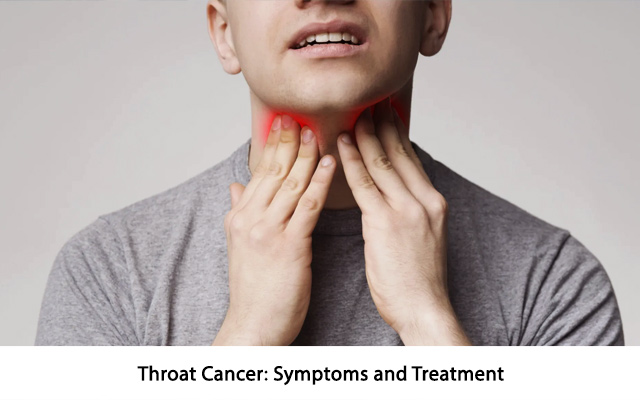Throat cancer is characterized by malignant growth in the throat. This includes cancer of the larynx (voice box), tonsils and pharynx. Like most cancers, early detection is important in throat cancer for successful outcomes and effective treatment. Know the symptoms and treatments for throat cancer below.
Symptoms of Throat Cancer
Throat cancer can affect both the larynx (voice box) and the pharynx (throat), and the symptoms can vary depending on which part is involved. Here are the specific symptoms for each.
Symptoms of Throat Cancer in Larynx
- Hoarseness or Voice Changes: A persistent hoarse voice or changes in the sound of the voice, which may worsen over time.
- Difficulty Speaking: Struggling to speak or having a weak or raspy voice.
- Persistent Throat Pain: A sore throat that doesn’t go away, often with a feeling of discomfort when speaking.
- Difficulty Swallowing: Pain or discomfort while swallowing, especially when it worsens during speaking or eating.
- Lump in the Neck: A noticeable lump or swelling in the neck due to enlarged lymph nodes.
- Breathing Difficulty: As the tumour grows, it may obstruct the airway, causing wheezing or difficulty breathing.
Symptoms of Throat Cancer in Pharynx
- Sore Throat: A persistent sore throat that does not improve with treatment.
- Difficulty Swallowing (Dysphagia): A feeling of food being stuck in the throat or pain while swallowing, particularly in the back of the throat.
- Ear Pain: Unexplained ear pain, often on one side, without a history of ear infections.
- Bad Breath: Chronic bad breath or a foul odour from the mouth.
- Voice Changes: A muffled or altered voice due to changes in the throat area.
- Persistent Cough: A chronic cough, often accompanied by blood or mucus.
Diagnosis of Throat Cancer
Some of the common diagnostic tests for throat cancer are as follows.
1. CT Scan
A CT (Computed Tomography) scan is often the first imaging test used when throat cancer is suspected. This non-invasive test provides detailed cross-sectional images of the throat, larynx, and surrounding tissues. It helps doctors assess the size, shape, and location of any abnormal growths or tumours and determine if cancer has spread to nearby lymph nodes or other areas.
2. Laryngoscopy
After the CT scan, a laryngoscopy is performed to directly examine the throat and larynx. This procedure involves inserting a thin, flexible tube (laryngoscope) through the nose or mouth to view the larynx (voice box) and surrounding structures. The doctor can look for any abnormal growths, lesions, or tumours that may be indicative of cancer.
3. Biopsy
If a suspicious area is found during the laryngoscopy, a biopsy is performed to confirm whether cancer cells are present. A small sample of tissue is taken from the abnormal area using a fine needle or forceps. This procedure is done under local anaesthesia, meaning you will not feel pain during the process. Some people worry that removing a tissue sample could cause the cancer to spread, but this is a misconception. A biopsy is a safe and essential procedure for diagnosing cancer.
Treatment for Throat Cancer
Some of the treatments for throat cancer are listed below.
- Radiation Therapy: The main treatment used for treating throat cancer is radiation therapy that uses high-energy rays to kill cancer cells or shrink tumours. This treatment is mainly for early-stage throat cancers. Radiation therapy can be used with or without chemotherapy to preserve the organs. It is not a painful treatment and does not burn any body parts.
- Chemotherapy: It is used for advanced throat cancers or when the cancer has spread to the different parts of the body. Chemotherapy is used with radiation therapy in order to improve outcomes for late-stage cancer patients.
- Targeted Therapy and Immunotherapy: Immunotherapy and targeted therapies are used when traditional treatments are ineffective or more advanced stage cancers.
Conclusion
If you notice any of the aforementioned symptoms, you must consult the doctor to rule out throat cancer. For this purpose, you can reach out to the leading throat cancer doctor in Kolkata.

